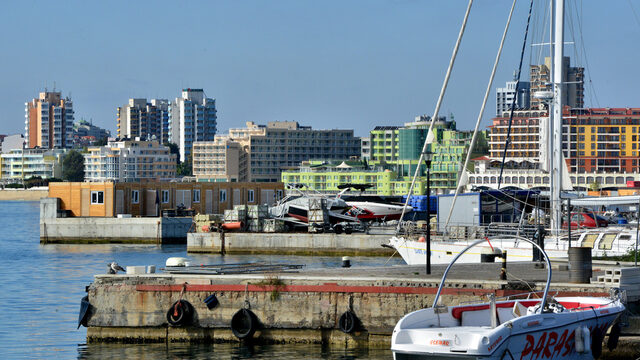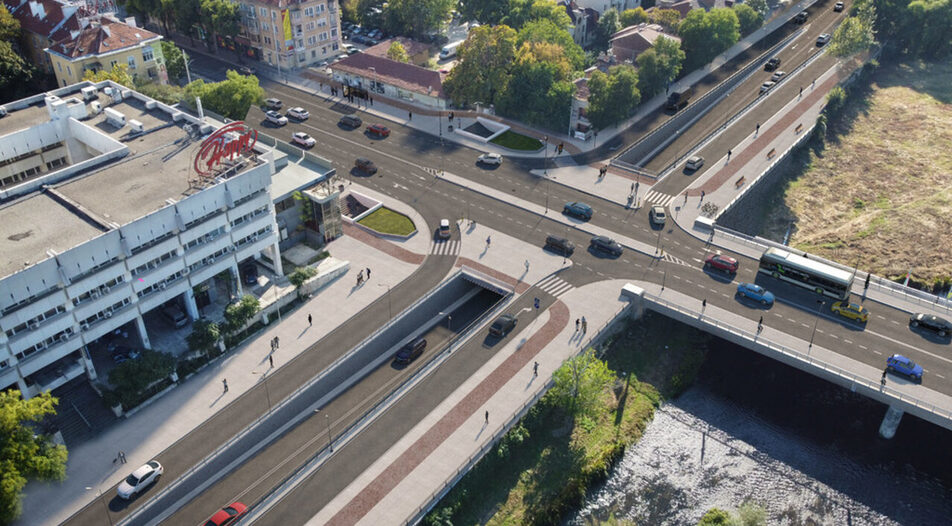This week, as I was standing on the bank of the largest Bulgarian river - Maritza, and observing how the municipality of Plovdiv was about to start building an urban highway, I found myself thinking about the power of numbers.
I have spent large periods of my life without paying much attention to them. Yet at some point I've returned to the calming reassuring presence of data. Data and its underpinning statistical principles, as well as pure mathematics, have always been a useful guide for me in times of doubt.
For example, if I was at Plovdiv municipality and was thinking about devoting 4 million euros to a new project which will create basically two speedy roads in the center, I would have certainly first turned to those who studied the numbers. Back in 2009, two American researchers published a paper called "The Fundamental Law of Road Congestion", which proved that more roads = more traffic. So no matter how many roads you build, you are never going to deal with congestion. There are other ways to deal with this problem.
Yet, oblivious to this numerical principle and its inevitability, the mayor of Plovdiv marches on towards a more congested future. He is far from the only one around here who ignores the data in favor of money, interests, short-term comfort or even, ignorance.
As a society, we only obsess with numbers and statistics on two occasions - elections and census. As luck would have it, we had results from both this week (more on both - below).
And I think we would be far better off if we paid more attention to numbers and their significance. For example, if we actually based our public transportation on average travel times, directions traveled, number of passengers and so on. Or we actually implemented the law of average speed on a given road and used all those cameras we have to control how fast people travel. Or if we had smaller census data samples every 2-3-5 years. And so on, and so on.
Many Bulgarian institutions do not collect nearly enough information, let alone process it right, in order to make good decisions. But we also fail to teach kids at school about how important those skills - understanding data, using it, collecting it - actually are. In a world where fake disinfo is everywhere, this is going to come back to haunt us.
Yes, a society hyper-based on numbers is a scary one (be it fictional as in Minority report or real, as in China). Yet one that is entirely devoid of attention to numbers is also scary - there are plenty of those examples in the world also.
If you ask me, this is the huge invisible dividing line in the world today: between the hyper-numerical and the numerically-averse societies. We're somewhere in the middle.
And so, without further ado, let's move on to the statistics.
This newsletter is helped by
Martin DimitrovPolitics this week:
The election season is done!For this year, at least. Here are the results of the parliamentary elections, held last weekend.
- GERB won the snap vote with just over a quarter of the ballots casted, earning 67 mandates, followed by the previous winners from WCC with a fifth of the vote and 53 seats.
- MRF kept third place, with practically the same number of votes, but gained 2 MPs compared to the previous parliament and will now have 36.
- The radical Vazrazhdane has doubled its results to 10.2% - and more than doubled its MPs to 27. Yet this is still less than what they hoped for.
- BSP dropped one place to fifth and will have 25 MPs, followed by Democratic Bulgaria's 20 seats for 7.4% of the vote.
- Lastly, Stefan Yanev's Bulgarian Rise squeezed in with 4.6% of the vote and 12 MPs, instead of Slavi Trifonov's TISP, which remained just below the 4% threshold - and thus out of the next National Assembly.
- So it's 7 parties in, and still no stable coalition in sight
Borissov's offer to everyone
The winner, Boyko Borissov's GERB party, effectively has no willing partners. They don't want to partner with MRF (largely seen as corruption brokers) and can't work with Vazrazhdane, who want Bulgaria out of the EU and NATO. Yet this leaves GERB with no choice but to try to work with the very people who want Borissov punished for corruption.
So the ex-PM extended his hand to all leaders, ostensibly singling out Democratic Bulgaria and WCC, to whom he proposed a wide "Euro-Atlantic" coalition. Borissov seems to be making all the right noises this time, understanding that the Russian card is a non-starter and sensing with his formidable survival instinct where he wants to stack his bets.
falls on deaf ears
WCC, who bet they would return stronger and rule in a more stable coalition, lost that wager. They fell short of the number of MPs required - alongside their former partners from BSP and Democratic Bulgaria (98 in total). They also lost some votes from disaffected left and right voters.
They are, however, not especially well placed to accept Borissov's offer either. He personally lambasted WCC leaders Kiril Petkov and Assen Vassilev for their alleged incompetence. And Petkov and Vassilev, for their part, even posed in front of Sofia Prison, saying that this should be Borissov's 'home' on account of his role in corruption.
So prepare for some weeks of negotiations and high posturing
During which time, of course, the caretaker government of President Radev will keep on governing (The President has already been in de facto control of the state for half the time since GERB fell). And then, probably new elections. At some point, this cycle will probably trigger calls for a change in the system - be it in favor of the Italian model, where the winner gets a bonus, or in the favor of the French one, with a Presidential authority.
And speaking of President Radev: He still doesn't think Bulgaria should take sides in the war
President Rumen Radev seems unfazed by accusations that he is taking Russia's side in the Ukraine conflict, and he showed it once again this week. After 9 heads of states from Eastern Europe (except Bulgaria and Hungary) issued a joint statement reiterating their support for the 2008 Bucharest NATO Summit decision concerning Ukraine's future membership, on Tuesday the Presidency of Bulgaria issued a position, explaining why Radev did not sign it.
According to Mr Radev, a decision on Ukraine's accession to NATO should be made only after peace is brokered between Russia and Ukraine. This provoked an angry tweet by Ukrainian Foreign Minister Dmytro Kuleba, as well as a call for Bulgaria to finally send military aid to Ukraine when the new Parliament is constituted, issued by Democratic Bulgaria.
and wants some Sweden made Grippens
The daily newspaper 24 hours showed a letter, signed by the Defense MInister, which calls on the Swedish fighter-jet maker to send an offer for 10 Grippens. The delivery should be made within 2 years. Rumen Radev, who is a fighter pilot and an Air-Force General, wanted to sign a deal with Grippen during a previous caretaker government of his, but once back in power in 2017, Boyko Borissov scrapped it and signed a 2-billion leva agreement with the US for 8 F-16s. We're still waiting on those, though, and will be until 2025-2030 and Bulgaria is bound to lose its air-force capability when its current MiG fighters are grounded.Economy
It's a hard life on debt markets these daysThe government had trouble issuing 100 million levs worth of debt until 2026. Submitted requests accounted for 156 million leva but, in the end, orders for only 102.75 million leva were approved. Yield has risen to 4.01% therefore. Just two weeks ago, 200 million leva of the same bonds were sold at a 3.01% yield, and then 150 million leva of a new five-year issue maturing in March 2028 was placed at a 4.13% yield. The bad results also forced the Ministry of Finance to abandon its calendar for the issuing of debt until the end of the year due to the unfavorable financial state of the markets.
Figures
0.5%Is the new forecast of Unicredit Bulbank for the economy next year. "A shallow recession" is how they term it.
8.7%
is the growth of the price index per producer in August 2022 compared to July 2022, according to NSI data.
0.8
Points up is the Business climate in September compared to August, according to results published by the National Statistics Institute.Business:
Outsourcing60K
American company ResultsCX has bought the Bulgarian outsourcing company 60K. Financial
details of the deal were not announced. 60K is among the ten largest companies by revenue in the Bulgarian outsourcing business, with 1,300 employees. The future owner has announced a plan to double them, said a Capital Weekly's source.
Railway
BulmarketEnergy:
Remember gas tenders? They're doing fine probablyBulgargaz has organized its first liquefied natural gas tender this year but the results were not publicly announced, implying that there were no concrete results.
The tender seeking gas for November had October 3rd as a deadline. Bulgargaz had expected offers to be made for roughly 142 million cubic meters, which is about 40% of the consumption for that month.
Such news provoked questions about the refusal of the 7 LNG cargoes, which Kiril Petkov's office previously agreed upon with American company Cheniere. The newly appointed caretaker minister Rossen Hristov and the new head of Bulgargaz Deniza Zlateva declined the cargoes last month after arguing that their price was too high. Petkov's cabinet had brokered a deal for 7 cargoes, running each month from October to April. The new caretaker cabinet has not yet secured another LNG deal.
Watch out for:
Person: Kostadin Kostadinovthe scandal-seeking leader of Vazrazhdane, kicked off his post-election parade with a scandal by trying to eject a Dnevnik reporter (from the Economedia publishing group, which includes KInsights) and other medias out of his press conference, calling them, among other insults, "foreign agents", serving the interests of the US.
Nickolay Sabev
The former Transport Minister, ex-owner of the large "Econt" courier service and largest benefactor of WCC, announced he is relinquishing his right to become an MP after the election and is leaving active politics, citing his desire to develop the business environment of the country as the main reason for his decision.
Date:
Next week.A Schengen check will be performed in Bulgaria next week, by an expert group from the European Commission. This is the last technical step before the European Council votes on whether Bulgaria and Romania should finally be allowed in the border-free area after 11 years of waiting.

PLACE
Nessebar Is the only municipality in Bulgaria which has been growing constantly since 2001. The small Unesco-heritage city on the Black Sea has not lost population in both censuses since then. The new, detailed results, out this week, show that almost all the other municipalities (bar 5), are falling in numbers. This includes Sofia and Varna, probably due to the pandemic and to unrecorded migration.WORD of the week
Контактьор (Contact-person)Boyko Borissov has quite a damaged reputation and he knows it. Yet, he loves to appear cooperative and as the person who would build bridges, so after GERB's election victory, he once again adopted this pose by appointing a team of supposedly politically neutral "contact persons" to lead negotiations for a new cabinet. These include former President Rossen Plevneliev and ex-Foreign Minister Solomon Passy.
According to urban slang, the word that somehow became associated with the contact group - контактьор - got to mean "someone who attempts contacting aliens." This, of course, was all the internet needed

This week, as I was standing on the bank of the largest Bulgarian river - Maritza, and observing how the municipality of Plovdiv was about to start building an urban highway, I found myself thinking about the power of numbers.
I have spent large periods of my life without paying much attention to them. Yet at some point I've returned to the calming reassuring presence of data. Data and its underpinning statistical principles, as well as pure mathematics, have always been a useful guide for me in times of doubt.












